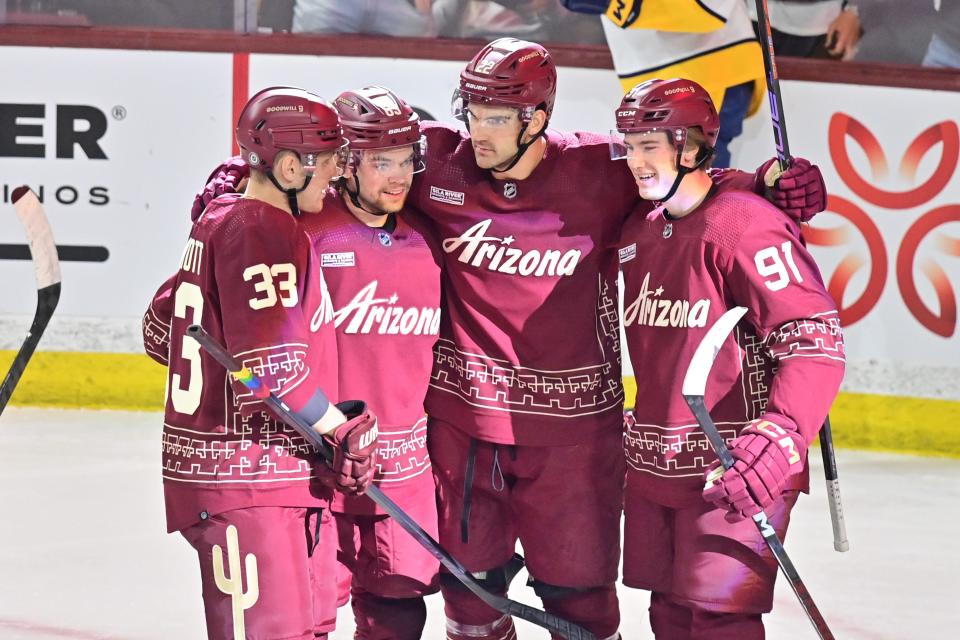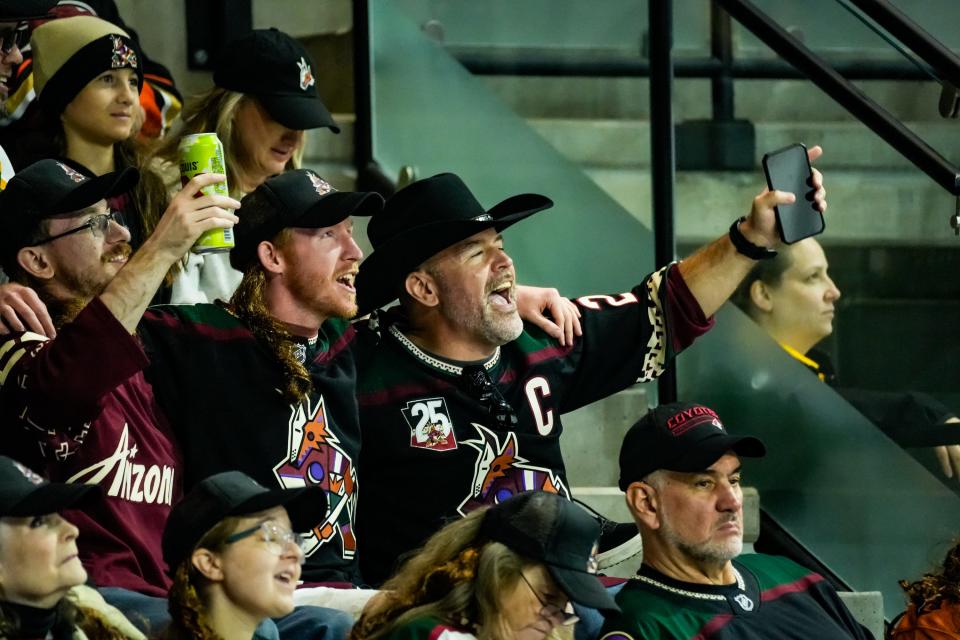Why are the Coyotes moving to Utah? We don't care enough about hockey in Arizona
The Arizona Coyotes are leaving and there are plenty of reasons why, but none are bigger than this: No one cares.
OK, hockey fans care. All both of them.
The NHL hasn’t connected with the casual sports fan or penetrated popular culture in any meaningful way as compared to the NFL or NBA.
You don’t have to know football to know Tom Brady or that guy in Kansas City who dates Taylor Swift.
You certainly don’t have to know basketball to know LeBron James or wear a pair of Jordans.
Hockey doesn’t have the sepia-tinted, black-and-white, “got us through the war,” and “America’s pastime” tradition of baseball.
And it doesn’t have an army of suburban moms driving SUVs full of kids hopped up on Gatorade and orange slices to grow at a grassroots level like soccer.
For most people in the U.S., and especially the Southwest, hockey is just a bunch of nameless, faceless guys skating around for diehards who learned the game from their parents on frozen ponds and rivers in rural areas back East and in the upper Midwest.
That’s not going to cut it, especially in a metro area like Phoenix where we’ve got a million other things to do with our time and money.
That’s not to say hockey can’t return. It can, and it should. And with the right people, team and marketing plan, it can work. Losing this team can be a blessing in disguise for hockey fans, if enough people approach it the right way.
Related: Will this be the last week in Arizona for NHL Coyotes franchise?
But first, how did we get to this point?
For me, it starts with the team’s move to Glendale about 20 years ago. It was nearly impossible for fans in heavily populated East Valley cities like Mesa, Chandler and Gilbert, to get to games on weeknights. A combination of traffic and distance combined to make it far more trouble than it was worth to get to a game.
The Coyotes needed to be downtown, but Suns owner Robert Sarver wasn’t interested in that, at all. And when Mat Ishbia took over the NBA franchise, he didn’t have any reason to want to share control of Footprint Center (a facility the Coyotes initially called home, despite partially obstructed upper-level views for hockey on one end).
Plus, the West Valley isn’t full of Canadians and Midwesterners like the East Valley.
Why not play in the East Valley, then?

That would have been ideal, but Tempe voters didn’t want it. They didn’t have any appetite for a new arena and entertainment complex. They didn’t want to pay taxes for another place to spend their money.
The team’s temporary home, the Mullett Arena, was just too small to be taken seriously. The place holds about 4,600 people. A good pro sports venue needs to be about three times that size.
And without a new arena, the Coyotes are like a down-and-out friend who said he was looking for a couch to crash on for a couple of days, but now he won’t leave.
Are there any other options?
There’s a solution in Phoenix that could work, but it seems shaky.
Scottsdale Mayor David Ortega saw the plan to put a new arena in Phoenix on the border of his town and said not in my backyard.
Then he flipped and said he’d support the plan as long as developers made sure the entrance didn’t face his residents, who apparently don’t want the traffic, noise or headaches associated with 40-something games a year, plus concerts, special events and a new influx of bars and restaurants.
Phoenix Mayor Kate Gallego hasn’t said anything, but she was set to meet with Coyotes leadership on Monday.
So the team is gone?
Kinda. The club is moving to Salt Lake City. The “Coyotes” team name is staying in Arizona, so if an arena deal is reached, the team could come back.
But the problem is that no one will care much either way.
OK, not “no one.” That’s overstating it. But there just aren’t that many diehard fans of hockey, or anything else for that matter, to make a massive investment make financial sense.

Marvel wouldn’t have taken over Hollywood if only comic book nerds were going to see the Avengers movies.
The NFL wouldn’t be a cultural behemoth without Super Bowl commercials and halftime concerts.
And the NBA would just be a bunch of tall guys in short pants without a marketing plan that made players into household names.
The NHL has to figure out a way to create stars.
Isn't hockey full of great players?
Great players aren't nearly enough.
Think of it this way: Can you name five hockey players? And if you can, call or text message five friends and see whether they can do the same.
The guess here is that the average person walking down the street in Phoenix or any of its suburbs would fail that challenge.
And that’s the problem that has to be fixed if hockey in the desert is going to work.
It can happen. It should happen.
Maricopa County has been one of the fastest-growing areas in the country for a generation. If there are enough hockey fans anywhere in the Southwest to support a team, it’s here.
So maybe losing the team will galvanize them into speaking up.
It’s the job of local leaders (ahem, mayors and wealthy developers) to attract and keep economic drivers like pro sports teams.
If the people make enough noise, elected officials and business leaders will listen.
But that hasn’t happened, yet.
It’s the main reason why the Coyotes are leaving town, maybe for now, maybe for good: No one cares.
Reach Moore at gmoore@azcentral.com or 602-444-2236. Follow him on X, formerly Twitter, @SayingMoore.
This article originally appeared on Arizona Republic: Why are the Coyotes moving to Utah? Because no one in Arizona cares
